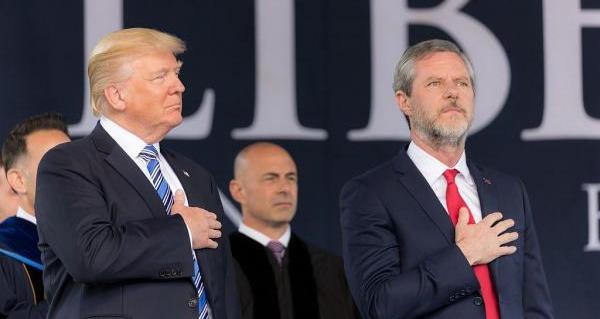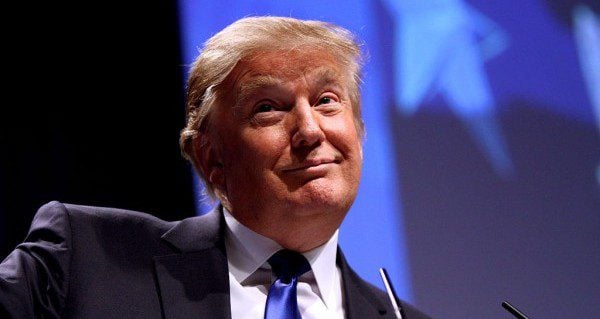For those of you brave souls, crying out in the wilderness, who still want to reclaim white evangelicalism from the “Trumpism” that has now come to largely define it, good luck.

Neil J. Young just splashed a lot of cold water on you.
In a piece called “Time to Face Facts: White Evangelicalism Has Always Been Right Wing,” he takes on Richard Mouw’s proclamation that, ““Despite Trumpism, I’m not quitting evangelicalism.” Mouw, former president of Fuller Seminary, has been one of those alternative voices within evangelicalism — calling for a moderate style of irenic, ecumenical, and socially conscious evangelicalism.
Evangelicals like Mouw have stayed in the institutions of evangelicalism, trying to be seasoning voices from within, and working to complexify the definition of an “evangelical.”
Recently, Russell Moore has played a similar role within the (mainly fundamentalist, now) Southern Baptist Convention. His very public criticisms of Donald Trump, his advocacy for racial justice, and his insistence that freedom of religion counts for Muslims, too, are putting him at odds now with many of his own Southern Baptist constituents, some of whom are threatening to withdraw their support from the ethics and policy agency he leads. But, at least on my very casual social media observations, I’m guessing a number of younger Southern Baptist leaders look more to Moore for ideological leadership, than to Robert Jeffress, Jack Graham, and the like. But for those younger, perhaps more socially-conscious conservatives, the numbers may not work in their favor.
(And of course, in the context of the SBC, there are no actual progressives, if by progressive you mean egalitarian and LGBTQ inclusive)
In his piece, Young suggests that any exceptions only serve to prove the rule. White Evangelicalism is linked to conservative, right-wing American politics. The Moral Majority hasn’t died, even if the name has changed.
Young writes that, despite the efforts of progressive evangelicals,
…the bulk of white evangelicals’ political efforts have always veered to the right, often to the extreme. From Civil Rights to Vietnam to abortion to gay rights, from national defense to tax policy to climate change to health care and on and on, white evangelicals have solidly and consistently championed the most conservative positions. Where some white evangelicals have at times been found on the other side of these issues, they have only served to highlight the enormous evangelical majority that remained firmly to the right. If exceptions prove the rule, progressive evangelicals have done so categorically.
Still, Mouw presses on in his post, amassing more examples that negate his argument. He notes that 15,000 college students at an evangelical conference in St. Louis last January “enthusiastically applauded a call by an African-American speaker to work diligently against racial injustice” and support the Black Lives Matter movement, but he conveniently ignores what soon followed. As Mark Oppenheimer pointed out in a piece for the New York Times, support for Black Lives Matter quickly dissipated among these young evangelicals once they realized the movement’s intersectional stance acknowledged that gay and trans lives mattered too.
Young’s cold water splash is accurate. What Young doesn’t mention, though, is that, while this analysis is true of evangelicalism for the past century or more, it wasn’t always that way.
As sociologist David Moberg argues in The Great Reversal, prior to the twentieth-century, evangelicals were leaders in progressive social reform movements. Many of them looked not just to convert souls, but change the world for the better, viewing progressive (for the time) social politics as the best way to do so.
And if you go back to nineteenth-century evangelical revivalism (as Donald Dayton has persuasively argued), you find leaders like Charles Finney, publicly asserting that God wouldn’t bless their revival if they didn’t first work to change unjust social structures, like slavery. Many of the forebears of contemporary evangelical Christianity were socially conscious abolitionists and egalitarians — even early feminists.
Last week, I participated in an excellent symposium on “Pietism: A Usable History” at Bethel University. A number of the speakers argued that, if there’s a future for evangelicalism, the best way forward for evangelicalism is backward – back to the “pietist impulse” when Christianity was a matter of the heart and of the hands; of service and solidarity, rather than of precise doctrine, political power, and drawing harsh boundaries between the in and the out.
Personally, I have given up the evangelical label, having shifted enough in my own theology so that what typically counts as “evangelical” no longer fits me.
But I do appreciate those who choose to remain in evangelicalism’s structures, its schools, churches, and denominations, who insist on complexifying its identity.
In her terrific book, Apostles of Reason, Molly Worthen speaks to that diversity:
The term evangelical mind conjures images of a creature of many faces sharing one brain, or at least a movement of people who think and act in concert. No metaphor could be further from the truth. This story of shifting and conflicting authorities, evolving alliances and feuds, and debate over the essence of Christian identity means that if we continue to speak of an evangelical mind–if we continue to use the word evangelical at all, and we will–we must allow room for diversity and internal contradiction, for those who love the label and those who hate it. We must recognize that American evangelicalism owes more to its fractures and clashes, its anxieties and doubts, than to any political pronouncement or point of doctrine. (264)
Young’s argument is those who insist that evangelicalism is not, by definition, right-wing conservative politics, are just fighting for a lost cause; the exceptions will only serve to prove the rule.
He may indeed be right. And I admit: I wouldn’t want that job. But on the other hand, history is not fixed. Things can change and “Great reversals” do happen.











